- Home
- Anthony Trollope
Rachel Ray Page 3
Rachel Ray Read online
Page 3
CHAPTER III.
THE ARM IN THE CLOUDS.
There was plenty of time for full inquiry and full reply betweenMrs. Ray and Mrs. Prime before Rachel opened the cottage door, andinterrupted them. It was then nearly half-past ten. Rachel had neverbeen so late before. The last streak of the sun's reflection in theeast had vanished, the last ruddy line of evening light had gone, andthe darkness of the coming night was upon them. The hour was late forany girl such as Rachel Ray to be out alone.
There had been a long discussion between the mother and theelder daughter; and Mrs. Ray, believing implicitly in the lastannouncements made to her, was full of fears for her child. Theutmost rigour of self-denying propriety should have been exercisedby Rachel, whereas her conduct had been too dreadful almost to bedescribed. Two or three hours since Mrs. Ray had fondly promised thatshe would trust her younger daughter, and had let her forth alone,proud in seeing her so comely as she went. An idea had almost enteredher mind that if the young man was very steady, such an acquaintancemight perhaps be not altogether wicked. But everything was changednow. All the happiness of her trust was gone. All her sweet hopeswere crushed. Her heart was filled with fear, and her face was palewith sorrow.
"Why should she know where he was to be?" Dorothea had asked. "But heis not at Exeter;--he is here, and she was with him." Then the twohad sat gloomily together till Rachel returned. As she came in therewas a little forced laugh upon her face. "I am late; am I not?" shesaid. "Oh, Rachel, very late!" said her mother. "It is half-pastten," said Mrs. Prime. "Oh, Dolly, don't speak with that terriblevoice, as though the world were coming to an end," said Rachel; andshe looked up almost savagely, showing that she was resolved tofight.
But it may be as well to say a few words about the firm of Messrs.Bungall and Tappitt, about the Tappitt family generally, and aboutMr. Luke Rowan, before any further portion of the history of thatevening is written.
Why there should have been any brewery at all at Baslehurst, seeingthat everybody in that part of the world drinks cider, or how, undersuch circumstances, Messrs. Bungall and Tappitt had managed to liveupon the proceeds of their trade, I cannot pretend to say. Baslehurstis in the heart of the Devonshire cider country. It is surroundedby orchards, and farmers talk there of their apples as they do oftheir cheese in Cheshire, or their wheat in Essex, or their sheep inLincolnshire. Men drink cider by the gallon,--by the gallon daily;cider presses are to be found at every squire's house, at everyparsonage, and every farm homestead. The trade of a brewer atBaslehurst would seem to be as profitless as that of a breeches-makerin the Highlands, or a shoemaker in Connaught;--but neverthelessBungall and Tappitt had been brewers in Baslehurst for the last fiftyyears, and had managed to live out of their brewery.
It is not to be supposed that they were great men like the mighty menof beer known of old,--such as Barclay and Perkins, or Reid and Co.Nor were they new, and pink, and prosperous, going into Parliamentfor this borough and that, just as they pleased, like the modernheroes of the bitter cask. When the student at Oxford was asked whatman had most benefited humanity, and when he answered "Bass," I thinkthat he should not have been plucked. It was a fair average answer.But no student at any university could have said as much for Bungalland Tappitt without deserving utter disgrace, and whatever penancean outraged examiner could inflict. It was a sour and muddy streamthat flowed from their vats; a beverage disagreeable to the palate,and very cold and uncomfortable to the stomach. Who drank it Icould never learn. It was to be found at no respectable inn. It wasadmitted at no private gentleman's table. The farmers knew nothingof it. The labourers drenched themselves habitually with cider.Nevertheless the brewery of Messrs. Bungall and Tappitt was keptgoing, and the large ugly square brick house in which the Tappittfamily lived was warm and comfortable. There is something in the veryname of beer that makes money.
Old Bungall, he who first established the house, was still rememberedby the seniors of Baslehurst, but he had been dead more than twentyyears before the period of my story. He had been a short, fat oldman, not much above five feet high, very silent, very hard, andvery ignorant. But he had understood business, and had establishedthe firm on a solid foundation. Late in life he had taken intopartnership his nephew Tappitt, and during his life had been a severetaskmaster to his partner. Indeed the firm had only assumed itspresent name on the demise of Bungall. As long as he had lived ithad been Bungall's brewery. When the days of mourning were over,then--and not till then--Mr. Tappitt had put up a board with thejoint names of the firm as at present called.
It was believed in Baslehurst that Mr. Bungall had not bequeathed hisundivided interest in the concern to his nephew. Indeed people wentso far as to say that he had left away from Mr. Tappitt all that hecould leave. The truth in that respect may as well be told at once.His widow had possessed a third of the profits of the concern, inlieu of her right to a full half share in the concern, which wouldhave carried with it the onus of a full half share of the work. Thatthird and those rights she had left to her nephew,--or rather to hergreat-nephew, Luke Rowan. It was not, however, in this young man'spower to walk into the brewery and claim a seat there as a partner.It was not in his power to do so, even if such should be his wish.When old Mrs. Bungall died at Dawlish at the very advanced age ofninety-seven, there came to be, as was natural, some little disputebetween Mr. Tappitt and his distant connection, Luke Rowan. Mr.Tappitt suggested that Luke should take a thousand pounds down, andwalk forth free from all contamination of malt and hops. Luke'sattorney asked for ten thousand. Luke Rowan at the time was articledto a lawyer in London, and as the dinginess of the chambers which hefrequented in Lincoln's Inn Fields appeared to him less attractivethan the beautiful rivers of Devonshire, he offered to go into thebrewery as a partner. It was at last settled that he should placehimself there as a clerk for twelve months, drawing a certainmoderate income out of the concern; and that if at the end of theyear he should show himself to be able, and feel himself to bewilling, to act as a partner, the firm should be changed to Tappittand Rowan, and he should be established permanently as a Baslehurstbrewer. Some information, however, beyond this has already been givento the reader respecting Mr. Rowan's prospects. "I don't think heever will be a partner," Rachel had said to her mother, "becausehe quarrels with Mr. Tappitt." She had been very accurate in herstatement. Mr. Rowan had now been three months at Baslehurst, and hadnot altogether found the ways of his relative pleasant. Mr. Tappittwished to treat him as a clerk, whereas he wished to be treated asa partner. And Mr. Tappitt had by no means found the ways of theyoung man to be pleasant. Young Rowan was not idle, nor did he lackintelligence; indeed he possessed more energy and cleverness than,in Tappitt's opinion, were necessary to the position of a brewer inBaslehurst; but he was by no means willing to use these good gifts inthe manner indicated by the sole existing owner of the concern. Mr.Tappitt wished that Rowan should learn brewing seated on a stool, andthat the lessons should be purely arithmetical. Luke was instructedas to the use of certain dull, dingy, disagreeable ledgers, andinformed that in them lay the natural work of a brewer. But hedesired to learn the chemical action of malt and hops upon eachother, and had not been a fortnight in the concern before hesuggested to Mr. Tappitt that by a salutary process, which hedescribed, the liquor might be made less muddy. "Let us brew goodbeer," he had said; and then Tappitt had known that it would not do."Yes," said Tappitt, "and sell for twopence a pint what will cost youthreepence to make!" "That's what we've got to look to," said Rowan."I believe it can be done for the money,--only one must learn howto do it." "I've been at it all my life," Tappitt said. "Yes, Mr.Tappitt; but it is only now that men are beginning to appreciateall that chemistry can do for them. If you'll allow me I'll make anexperiment on a small scale." After that Mr. Tappitt had declaredemphatically to his wife that Luke Rowan should never become apartner of his. "He would ruin any business in the world," saidTappitt. "And as to conceit!" It is true that Rowan was conceited,and perhaps true also that he would have ruined the brewery h
ad hebeen allowed to have his own way.
But Mrs. Tappitt by no means held him in such aversion as did herhusband. He was a well-grown, good-looking young man for whom hisfriends had made comfortable provision, and Mrs. Tappitt had threemarriageable daughters. Her ideas on the subject of young men ingeneral were by no means identical with those held by Mrs. Ray. Shewas aware how frequently it happened that a young partner would marrya daughter of the senior in the house, and it seemed to her thatspecial provision for such an arrangement was made in this case.Young Rowan was living in her house, and was naturally thrown intogreat intimacy with her girls. It was clear to her quick eye thathe was of a susceptible disposition, fond of ladies' society, andaltogether prone to those pleasant pre-matrimonial conversations,from the effects of which it is so difficult for an inexperiencedyoung man to make his escape. Mrs. Tappitt was minded to devote tohim Augusta, the second of her flock,--but not so minded with anyobstinacy of resolution. If Luke should prefer Martha, the elder, orCherry, the younger girl, Mrs. Tappitt would make no objection; butshe expected that he should do his duty by taking one of them. "Laws,T., don't be so foolish," she said to her husband, when he made hiscomplaint to her. She always called her husband T., unless when thesolemnity of some special occasion justified her in addressing himas Mr. Tappitt. To have called him Tom or Thomas, would, in herestimation, have been very vulgar. "Don't be so foolish. Did younever have to do with a young man before? Those tantrums will allblow off when he gets himself into harness." The tantrums spoken ofwere Rowan's insane desire to brew good beer, but they were of sofatal a nature that Tappitt was determined not to submit himself tothem. Luke Rowan should never be partner of his,--not though he hadtwenty daughters waiting to be married!
Rachel had been acquainted with the Tappitts before young Rowanhad come to Baslehurst, and had been made known to him by them allcollectively. Had they shared their mother's prudence they wouldprobably not have done anything so rash. Rachel was better-lookingthan either of them,--though that fact perhaps might not have beenknown to them. But in justice to them all I must say that they lackedtheir mother's prudence. They were good-humoured, laughing, ordinarygirls,--very much alike, with long brown curls, fresh complexions,large mouths, and thick noses. Augusta was rather the taller of thethree, and therefore, in her mother's eyes, the beauty. But the girlsthemselves, when their distant cousin had come amongst them, had notthought of appropriating him. When, after the first day, they becameintimate with him, they promised to introduce him to the beautiesof the neighbourhood, and Cherry had declared her conviction thathe would fall in love with Rachel Ray directly he saw her. "She istall, you know," said Cherry, "a great deal taller than us." "ThenI'm sure I shan't like her," Luke had said. "Oh, but you must likeher, because she is a friend of ours," Cherry had answered; "and Ishouldn't be a bit surprised if you fell violently in love with her."Mrs. Tappitt did not hear all this, but, nevertheless, she beganto entertain a dislike to Rachel. It must not be supposed that sheadmitted her daughter Augusta to any participation in her plans.Mrs. Tappitt could scheme for her child, but she could not teach herchild to scheme. As regarded the girl, it must all fall out after thenatural, pleasant, everyday fashion of such things; but Mrs. Tappittconsidered that her own natural advantages were so great that shecould make the thing fall out as she wished. When she was informedabout a fortnight after Rowan's arrival in Baslehurst that RachelRay had been walking with the party from the brewery, she could notprevent herself from saying an ill-natured word or two. "Rachel Rayis all very well," she said, "but she is not the person whom youshould show off to a stranger as your particular friend."
"Why not, mamma?" said Cherry.
"Why not, my dear! There are reasons why not. Mrs. Ray is very wellin her way, but--"
"Her husband was a gentleman," said Martha, "and a great friend ofMr. Comfort's."
"My dear, I have nothing to say against her," said the mother, "onlythis; that she does not go among the people we know. There is Mrs.Prime, the other daughter; her great friend is Miss Pucker. I don'tsuppose you want to be very intimate with Miss Pucker." The brewer'swife had a position in Baslehurst and wished that her daughtersshould maintain it.
It will now be understood in what way Rachel had formed heracquaintance with Luke Rowan, and I think it may certainly beadmitted that she had been guilty of no great impropriety;--unless,indeed, she had been wrong in saying nothing of the acquaintance toher mother. Previous to those ill-natured tidings brought home as tothe first churchyard meeting, Rachel had seen him but twice. On thefirst occasion she had thought but little of it,--but little of Lukehimself or of her acquaintance with him. In simple truth the matterhad passed from her mind, and therefore she had not spoken of it.When they met the second time, Luke had walked much of the wayhome with her,--with her alone,--having joined himself to her whenthe Tappitt girls went into their house as Rachel had afterwardsdescribed to her mother. In all that she had said she had spokenabsolutely the truth; but it cannot be pleaded on her behalf thatafter this second meeting with Mr. Rowan she had said nothing of himbecause she had thought nothing. She had indeed thought much, but ithad seemed well to her to keep her thoughts to herself.
The Tappitt girls had by no means given up their friend because theirmother had objected to Miss Pucker; and when Rachel met them on thatSaturday evening,--that fatal Saturday,--they were very gracious toher. The brewery at Baslehurst stood on the outskirts of the town, ina narrow lane which led from the church into the High-street. Thislane,--Brewery-lane, as it was called,--was not the main approach tothe church; but from the lane there was a stile into the churchyard,and a gate, opened on Sundays, by which people on that side reachedthe church. From the opposite side of the churchyard a road led awayto the foot of the High-street, and out towards the bridge whichdivided the town from the parish of Cawston. Along one side of thisroad there was a double row of elms, having a footpath beneath them.This old avenue began within the churchyard, running across the lowerend of it, and was continued for some two hundred yards beyond itsprecincts. This, then, would be the way which Rachel would naturallytake in going home, after leaving the Miss Tappitts at their door;but it was by no means the way which was the nearest for Mrs. Primeafter leaving Miss Pucker's lodgings in the High-street, seeing thatthe High-street itself ran direct to Cawston bridge.
And it must also be explained that there was a third path out of thechurchyard, not leading into any road, but going right away acrossthe fields. The church stood rather high, so that the land slopedaway from it towards the west, and the view there was very pretty.The path led down through a small field, with high hedgerows, and byorchards, to two little hamlets belonging to Baslehurst, and this wasa favourite walk with the people of the town. It was here that Rachelhad walked with the Miss Tappitts on that evening when Luke Rowan hadfirst accompanied her as far as Cawston bridge, and it was here thatthey agreed to walk again on the Saturday when Rowan was supposed tobe away at Exeter. Rachel was to come along under the elms, and wasto meet her friends there, or in the churchyard, or, if not so, thenshe was to call for them at the brewery.
She found the three girls leaning against the rails near thechurchyard stile. "We have been waiting ever so long," said Cherry,who was more specially Rachel's friend.
"Oh, but I said you were not to wait," said Rachel, "for I never amquite sure whether I can come."
"We knew you'd come," said Augusta, "because--"
"Because what?" asked Rachel.
"Because nothing," said Cherry. "She's only joking."
Rachel said nothing more, not having understood the point of thejoke. The joke was this,--that Luke Rowan had come back from Exeter,and that Rachel was supposed to have heard of his return, andtherefore that her coming for the walk was certain. But Augusta hadnot intended to be ill-natured, and had not really believed what shehad been about to insinuate. "The fact is," said Martha, "that Mr.Rowan has come home; but I don't suppose we shall see anything of himthis evening as he is busy with papa."
/> Rachel for a few minutes became silent and thoughtful. Her mind hadnot yet freed itself from the effects of her conversation with hermother, and she had been thinking of this young man during the wholeof her solitary walk into town. But she had been thinking of him aswe think of matters which need not put us to any immediate trouble.He was away at Exeter, and she would have time to decide whether orno she would admit his proffered intimacy before she should see himagain. "I do so hope we shall be friends," he had said to her as hegave her his hand when they parted on Cawston bridge. And then he hadmuttered something, which she had not quite caught, as to Baslehurstbeing altogether another place to him since he had seen her. Shehad hurried home on that occasion with a feeling, half pleasant andhalf painful, that something out of the usual course had occurred toher. But, after all, it amounted to nothing. What was there that shecould tell her mother? She had no special tale to tell, and yet shecould not speak of young Rowan as she would have spoken of a chanceacquaintance. Was she not conscious that he had pressed her handwarmly as he parted from her?
Rachel herself entertained much of that indefinite fear of young menwhich so strongly pervaded her mother's mind, and which, as regardedher sister, had altogether ceased to be indefinite. Rachel knew thatthey were the natural enemies of her special class, and that any kindof friendship might be allowed to her, except a friendship with anyof them. And as she was a good girl, loving her mother, anxious to dowell, guided by pure thoughts, she felt aware that Mr. Rowan shouldbe shunned. Had it not been that he himself had told her that he wasto be in Exeter, she would not have come out to walk with the brewerygirls on that evening. What she might hereafter decide upon doing,how these affairs might be made to arrange themselves, she by nomeans could foresee;--but on that evening she had thought she wouldbe safe, and therefore she had come out to walk.
"What do you think?" said Cherry; "we are going to have a party nextweek."
"It won't be till the week after," said Augusta.
"At any rate, we are going to have a party, and you must come. You'llget a regular invite, you know, when they're sent out. Mr. Rowan'smother and sister are coming down on a visit to us for a few days,and so we're going to be quite smart."
"I don't know about going to a party. I suppose it is for a dance?"
"Of course it is for a dance," said Martha.
"And of course you'll come and dance with Luke Rowan," said Cherry.Nothing could be more imprudent than Cherry Tappitt, and Augustawas beginning to be aware of this, though she had not been allowedto participate in her mother's schemes. After that, there was muchtalking about the party, but the conversation was chiefly kept up bythe Tappitt girls. Rachel was almost sure that her mother would notlike her to go to a dance, and was quite sure that her sister wouldoppose such iniquity with all her power; therefore she made nopromise. But she listened as the list was repeated of those who wereexpected to come, and asked some few questions as to Mrs. Rowan andher daughter. Then, at a sudden turn of a lane, a lane that led backto the town by another route, they met Luke Rowan himself.
He was a cousin of the Tappitts, and therefore, though therelationship was not near, he had already assumed the privilege ofcalling them by their Christian names; and Martha, who was nearlythirty years old, and four years his senior, had taught herselfto call him Luke; with the other two he was as yet Mr. Rowan. Thegreeting was of course very friendly, and he returned with them ontheir path. To Rachel he raised his hat, and then offered his hand.She had felt herself to be confused the moment she saw him,--soconfused that she was not able to ask him how he was with ordinarycomposure. She was very angry with herself, and heartily wished thatshe was seated with the Dorcas women at Miss Pucker's. Any positionwould have been better for her than this, in which she was disgracingherself and showing that she could not bear herself before this youngman as though he were no more than an ordinary acquaintance. Her mindwould revert to that hand-squeezing, to those muttered words, and toher mother's caution. When he remarked to her that he had come backearlier than he expected, she could not take his words as thoughthey signified nothing. His sudden return was a momentous fact toher, putting her out of her usual quiet mode of thought. She saidlittle or nothing, and he, at any rate, did not observe that she wasconfused; but she was herself so conscious of it, that it seemed toher that all of them must have seen it.
Thus they sauntered along, back to the outskirts of the town, and sointo the brewery lane, by a route opposite to that of the churchyard.The whole way they talked of nothing but the party. Was Miss Rowanfond of dancing? Then by degrees the girls called her Mary, declaringthat as she was a cousin they intended so to do. And Luke said thathe ought to be called by his Christian name; and the two youngergirls agreed that he was entitled to the privilege, only they wouldask mamma first; and in this way they were becoming very intimate.Rachel said but little, and perhaps not much that was said wasaddressed specially to her, but she seemed to feel that she wasincluded in the friendliness of the gathering. Every now and thenLuke Rowan would address her, and his voice was pleasant to her ears.He had made an effort to walk next to her,--an attempt almost tooslight to be called an effort, which she had, almost unconsciously,frustrated, by so placing herself that Augusta should be betweenthem. Augusta was not quite in a good humour, and said one or twowords which were slightly snubbing in their tendency; but this wasmore than atoned for by Cherry's high good-humour.
When they reached the brewery they all declared themselves to be verymuch astonished on learning that it was already past nine. Rachel'ssurprise, at any rate, was real. "I must go home at once," shesaid; "I don't know what mamma will think of me." And then, wishingthem all good-bye, without further delay she hurried on into thechurchyard.
"I'll see you safe through the ghosts at any rate," said Rowan.
"I'm not a bit afraid of churchyard ghosts," said Rachel, moving on.But Rowan followed her.
"I've got to go into town to meet your father," said he to the othergirls, "and I'll be back with him."
Augusta saw with some annoyance that he had overtaken Rachel beforeshe had passed over the stile, and stood lingering at the door longenough to be aware that Luke was over first. "That girl is a flirt,after all," she said to her sister Martha.
Luke was over the stile first, and then turned round to assist MissRay. She could not refuse him her hand in such a position; or if shecould have done so she lacked the presence of mind that was necessaryfor such refusal. "You must let me walk home with you," he said.
"Indeed I will do no such thing. You told Augusta that you were goingto her papa in the town."
"So I am, but I will see you first as far as the bridge; you can'trefuse me that."
"Indeed I can, and indeed I will. I beg you won't come. I am sure youwould not wish to annoy me."
"Look," said he, pointing to the west; "did you ever see such asetting sun as that? Did you ever see such blood-red colour?" Thelight was very wonderful, for the sun had just gone down and allthe western heavens were crimson with its departing glory. In thefew moments that they stood there gazing it might almost have beenbelieved that some portentous miracle had happened, so deep anddark, and yet so bright, were the hues of the horizon. It seemed asthough the lands below the hill were bathed in blood. The elm treesinterrupted their view, so that they could only look out through thespaces between their trunks. "Come to the stile," said he. "If youwere to live a thousand years you might never again see such a sunsetas that. You would never forgive yourself if you missed it, just thatyou might save three minutes."
Rachel stepped with him towards the stile; but it was not solely hisentreaty that made her do so. As he spoke of the sun's glory hersharp ear caught the sound of a woman's foot close to the stile overwhich she had passed, and knowing that she could not escape at oncefrom Luke Rowan, she had left the main path through the churchyard,in order that the new comer might not see her there talking to him.So she accompanied him on till they stood between the trees, and thenthey remained encompassed as it were
in the full light of the sun'srays. But if her ears had been sharp, so were the eyes of this newcomer. And while she stood there with Rowan beneath the elms, hersister stood a while also on the churchyard path and recognized thefigures of them both.
"Rachel," said he, after they had remained there in silence for amoment, "live as long as you may, never on God's earth will you lookon any sight more lovely than that. Ah! do you see the man's arm, asit were; the deep purple cloud, like a huge hand stretched out fromsome other world to take you? Do you see it?"
The sound of his voice was very pleasant. His words to her young earsseemed full of poetry and sweet mysterious romance. He spoke to heras no one,--no man or woman,--had ever spoken to her before. She hada feeling, as painful as it was delicious, that the man's words weresweet with a sweetness which she had known in her dreams. He hadasked her a question, and repeated it, so that she was all but drivento answer him; but still she was full of the one great fact that hehad called her Rachel, and that he must be rebuked for so callingher. But how could she rebuke a man who had bid her look at God'sbeautiful works in such language as he had used?
"Yes, I see it; it is very grand; but--"
"There were the fingers, but you see how they are melting away. Thearm is there still, but the hand is gone. You and I can trace itbecause we saw it when it was clear, but we could not now show it toanother. I wonder whether any one else saw that hand and arm, or onlyyou and I. I should like to think that it was shown to us, and usonly."
It was impossible for her now to go back upon that word Rachel. Shemust pass it by as though she had not heard it. "All the world mighthave seen it had they looked," said she.
"Perhaps not. Do you think that all eyes can see alike?"
"Well, yes; I suppose so."
"All eyes will see a loaf of bread alike, or a churchyard stile, butall eyes will not see the clouds alike. Do you not often find worldsamong the clouds? I do."
"Worlds!" she said, amazed at his energy; and then she bethoughtherself that he was right. She would never have seen that hand andarm had he not been there to show it her. So she gazed down upon thechanging colours of the horizon, and almost forgot that she shouldnot have lingered there a moment.
And yet there was a strong feeling upon her that she wassinking,--sinking,--sinking away into iniquity. She ought not to havestood there an instant, she ought not to have been there with him atall;--and yet she lingered. Now that she was there she hardly knewhow to move herself away.
"Yes; worlds among the clouds," he continued; but before he did sothere had been silence between them for a minute or two. "Do younever feel that you look into other worlds beyond this one in whichyou eat, and drink, and sleep? Have you no other worlds in yourdreams?" Yes; such dreams she had known, and now, she almost thoughtthat she could remember to have seen strange forms in the clouds. Sheknew that henceforth she would watch the clouds and find them there.She looked down into the flood of light beneath her, with a fullconsciousness that he was close to her, touching her; with a fullconsciousness that every moment that she lingered there was a newsin; with a full consciousness, too, that the beauty of those fadingcolours seen thus in his presence possessed a charm, a sense of softdelight, which she had never known before. At last she uttered a longsigh.
"Why, what ails you?" said he.
"Oh, I must go; I have been so wrong to stand here. Good-bye; pray,pray do not come with me."
"But you will shake hands with me." Then he got her hand, and heldit. "Why should it be wrong for you to stand and look at the sunset?Am I an ogre? Have I done anything that should make you afraid ofme?"
"Do not hold me. Mr. Rowan I did not think you would behave likethat." The gloom of the evening was now coming on, and though buta few minutes had passed since Mrs. Prime had walked through thechurchyard, she would not have been able to recognize them had shewalked there now. "It is getting dark, and I must go instantly."
"Let me go with you, then, as far as the bridge."
"No, no, no. Pray do not vex me."
"I will not. You shall go alone. But stand while I say one word toyou. Why should you be afraid of me?"
"I am not afraid of you,--at least,--you know what I mean."
"I wonder,--I wonder whether--you dislike me."
"I don't dislike anybody. Good-night."
He had however again got her hand. "I'll tell you why I ask;--becauseI like you so much, so very much! Why should we not be friends? Well;there. I will not trouble you now. I will not stir from here till youare out of sight. But mind,--remember this; I intend that you shalllike me."
She was gone from him, fleeing away along the path in a run while thelast words were being spoken; and yet, though they were spoken in alow voice, she heard and remembered every syllable. What did the manmean by saying that he intended that she should like him? Like him!How could she fail of liking him? Only was it not incumbent on her totake some steps which might save her from ever seeing him again? Likehim, indeed! What was the meaning of the word? Had he intended to askher to love him? And if so, what answer must she make?
How beautiful had been those clouds! As soon as she was beyond thechurch wall, so that she could look again to the west, she gazed withall her eyes to see if there were still a remnant left of that arm.No; it had all melted into a monstrous shape, indistinct and gloomy,partaking of the darkness of night. The brightness of the vision wasgone. But he bade her look into the clouds for new worlds, and sheseemed to feel that there was a hidden meaning in his words. As shelooked out into the coming darkness, a mystery crept over her, asense of something wonderful that was out there, away,--of somethingso full of mystery that she could not tell whether she was thinkingof the hidden distances of the horizon, or of the distances of herown future life, which were still further off and more closelyhidden. She found herself trembling, sighing, almost sobbing,and then she ran again. He had wrapped her in his influence, andfilled her full of the magnetism of his own being. Her woman'sweakness,--the peculiar susceptibility of her nature, had neverbefore been touched. She had now heard the first word of romance thathad ever reached her ears, and it had fallen upon her with so great apower that she was overwhelmed.
Words of romance! Words direct from the Evil One, Mrs. Prime wouldhave called them! And in saying so she would have spoken the beliefof many a good woman and many a good man. She herself was a goodwoman,--a sincere, honest, hardworking, self-denying woman; a womanwho struggled hard to do her duty as she believed it had been taughtto her. She, as she walked through the churchyard,--having comedown the brewery lane with some inkling that her sister might bethere,--had been struck with horror at seeing Rachel standing withthat man. What should she do? She paused a moment to ask herselfwhether she should return for her; but she said to herself that hersister was obstinate, that a scene would be occasioned, that shewould do no good,--and so she passed on. Words of romance, indeed!Must not all such words be words from the Father of Lies, seeing thatthey are words of falseness? Some such thoughts passed through hermind as she walked home, thinking of her sister's iniquity,--of hersister who must be saved, like a brand from the fire, but whosesaving could now be effected only by the sternest of discipline. Thehours at the Dorcas meetings must be made longer, and Rachel mustalways be there.
In the mean time Rachel hurried home with her spirits all a-tremble.Of her immediately-coming encounter with her mother and her sistershe hardly thought much before she reached the door. She thoughtonly of him, how beautiful he was, how grand,--and how dangerous; ofhim and of his words, how beautiful they were, how grand, and howterribly dangerous! She knew that it was very late and she hurriedher steps. She knew that her mother must be appeased, and her sistermust be opposed,--but neither to her mother or to her sister wasgiven the depth of her thoughts. She was still thinking of him, andof the man's arm in the clouds, when she opened the door of thecottage at Bragg's End.

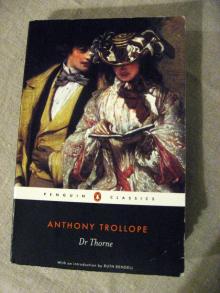 Doctor Thorne
Doctor Thorne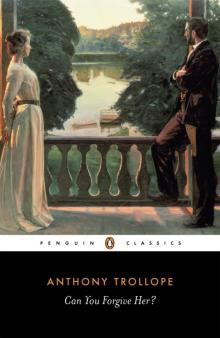 Can You Forgive Her?
Can You Forgive Her?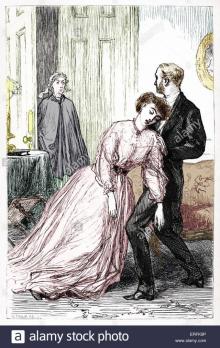 The Last Chronicle of Barset
The Last Chronicle of Barset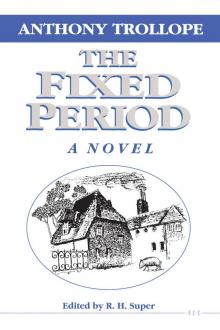 The Fixed Period
The Fixed Period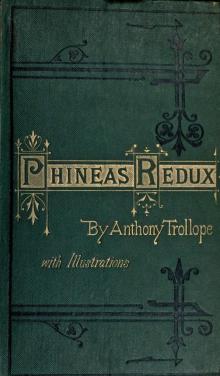 Phineas Redux
Phineas Redux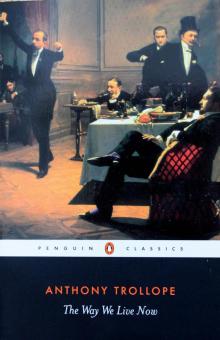 The Way We Live Now
The Way We Live Now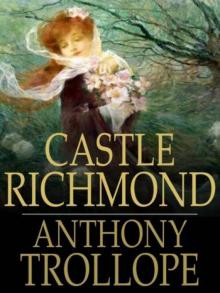 Castle Richmond
Castle Richmond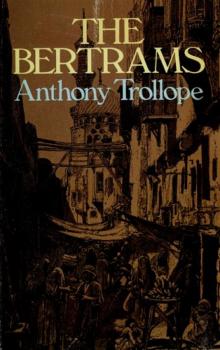 The Bertrams
The Bertrams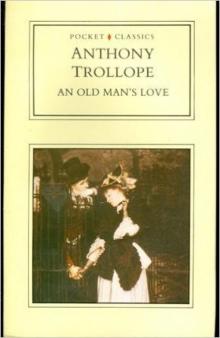 An Old Man's Love
An Old Man's Love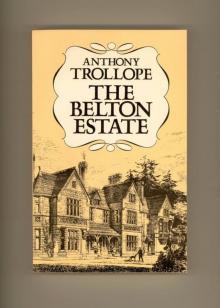 The Belton Estate
The Belton Estate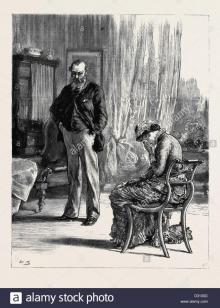 Marion Fay: A Novel
Marion Fay: A Novel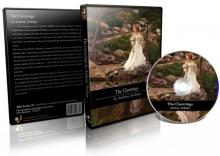 The Claverings
The Claverings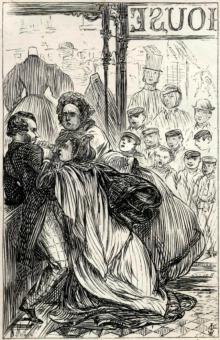 The Struggles of Brown, Jones, and Robinson
The Struggles of Brown, Jones, and Robinson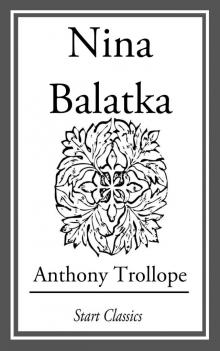 Nina Balatka
Nina Balatka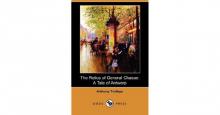 The Relics of General Chasse: A Tale of Antwerp
The Relics of General Chasse: A Tale of Antwerp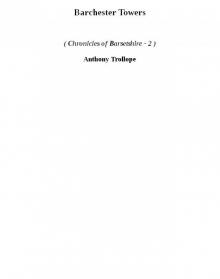 Barchester Towers cob-2
Barchester Towers cob-2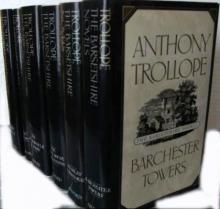 The Chronicles of Barsetshire
The Chronicles of Barsetshire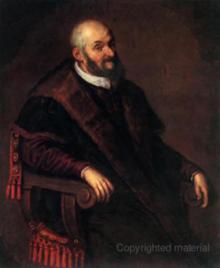 The Warden cob-1
The Warden cob-1 Framley Parsonage
Framley Parsonage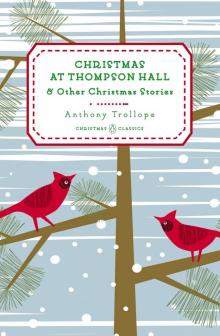 Christmas at Thompson Hall
Christmas at Thompson Hall The Warden
The Warden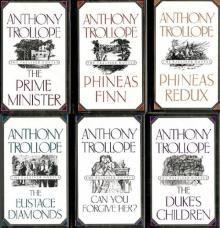 The Palliser Novels
The Palliser Novels The Small House at Allington
The Small House at Allington Barchester Towers
Barchester Towers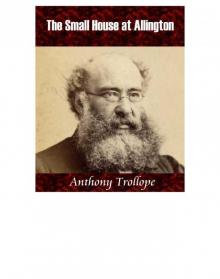 The Small House at Allington cob-5
The Small House at Allington cob-5 The Duke's Children
The Duke's Children Phineas Finn, the Irish Member
Phineas Finn, the Irish Member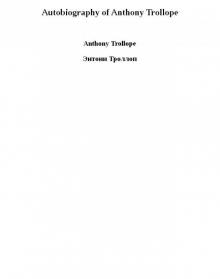 Autobiography of Anthony Trollope
Autobiography of Anthony Trollope